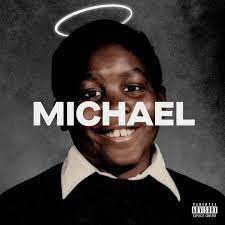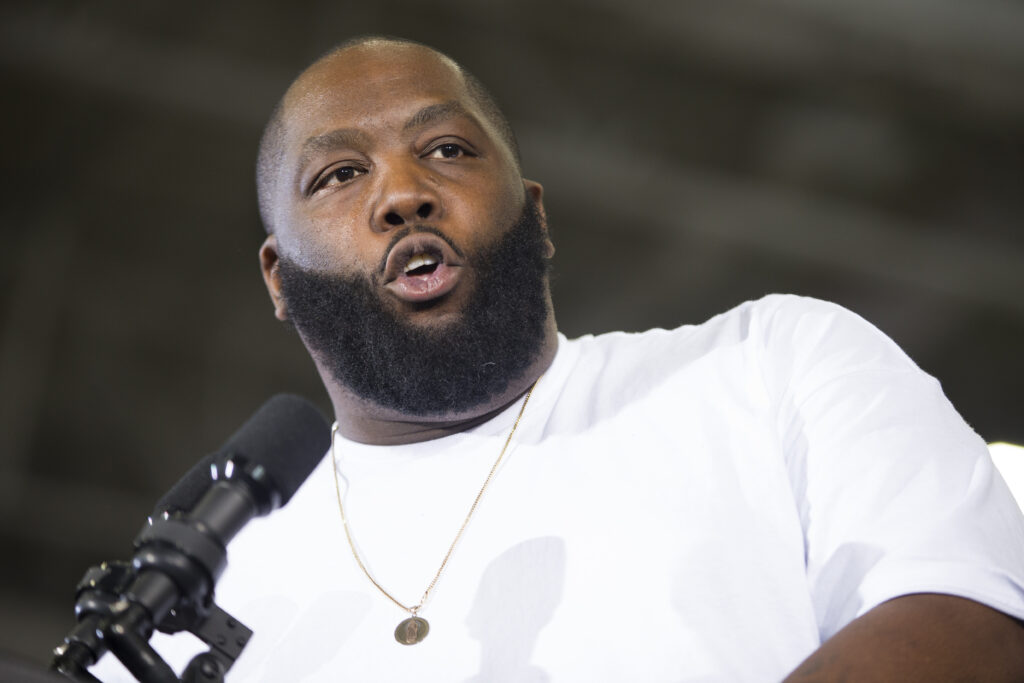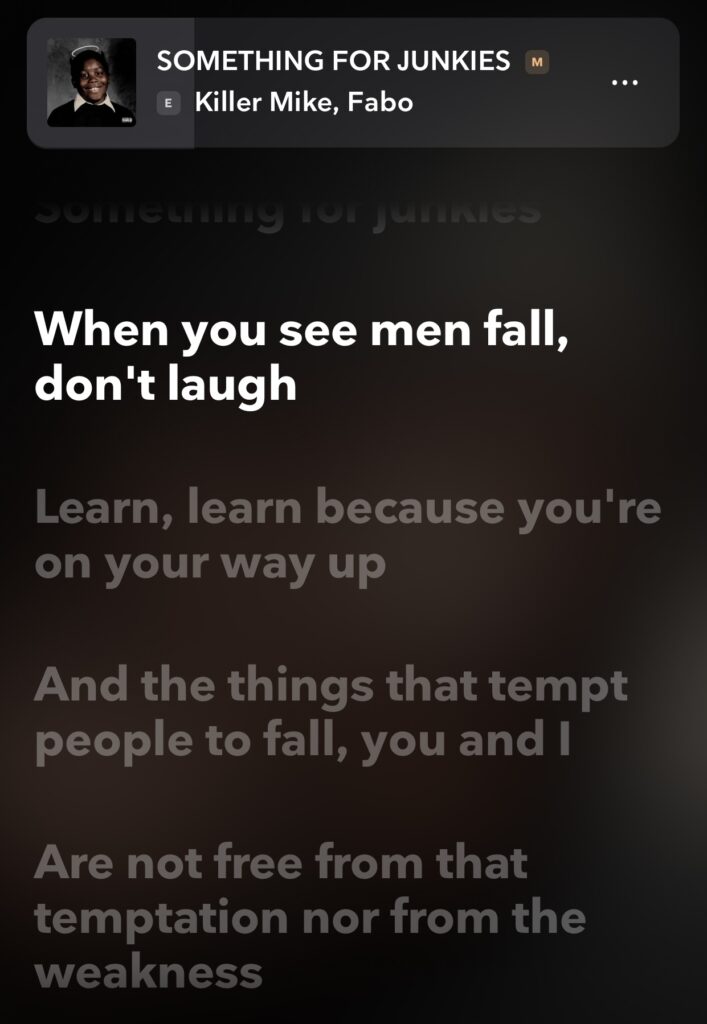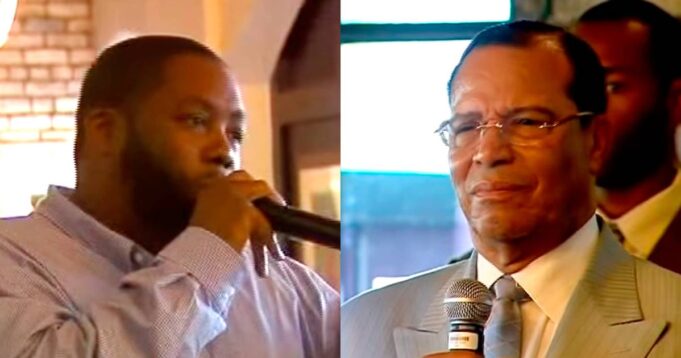by Willie Muhammad
Michael Render, known by his stage name Killer Mike, is a rap artist, activist and businessman.
Killer Mike was recently interviewed by Nation of Islam Student Minister Willie Muhammad of Mosque No. 46 in New Orleans about his new release “Michael,” his upbringing, the evolution of hip hop, and other topics. The interview was facilitated by Brother Don Enoch Muhammad. The Final Call presents a few select excerpts from that July 3, 2023, interview which have been edited for clarity.
Willie Muhammad (WM): “Michael” is a highly personal and introspective album for you. Can you discuss the significance of naming the album after yourself and the connection between your personal experiences and the themes explored in the project?
Killer Mike (KM): Well, Michael, like the album, is multilayered. So, Michael is the second of the Michaels, whose father is the first Michael. His daughter is the third Michael, and he has another son named Mikal. And we are named in honor of the Archangel Michael, whose name means “he who is like God.”
I’ve always thought highly of the name because I was a very curious child. And as Black children, you know, like we were taught by the Most Honorable Elijah Muhammad, we didn’t know who we were.

So that’s why we have the “X,” you know? You don’t know who you are, you just knew the name you were given. As a child kind of searching for who I was, and wanting to know that I looked up my first name. Once I saw what my first name meant … I just felt honored. To not only be named for an angel, but what that angel represented—God—meant a lot to me. So, I’ve always been very proud of the name.
And what I realized is that this nine-year-old kid invents a rap persona, even though he didn’t get named “Killer Mike,” ‘till years later. The rap swagger and persona that people know “Killer Mike” for is the invention of a nine-year-old child who just wants to be a … MC. And I wanted people before I left this earth, to understand that I was just a man. And I was a man who was raised in a fiercely proud Black neighborhood in Atlanta.
It was that neighborhood that housed everything from Black Protestant Christians to Catholics, to Al-Islam, to the Nation of Islam to Black Hebrews. Every type of Black person you could imagine was there. And all those Black people poured into me and us children to tell us to be the very best we could absolutely be. We were Earth’s Original people, and God loves us. And it was all-encompassing of our greatness. So, I’ve never felt second class.
WM: Let’s take a moment to talk about one of the many profoundly impactful songs on this album. It’s track number two, “Shed Tears.” I have not heard anything like this before in my years of listening to hip hop music. What I mean by that is the song appears to be ending and you come back on rapping with such great passion in a verse that is filled with self-examination, self-analysis and accountability. Why did you choose to do so?

KM: You know, “Message to the Black Man” is a book that really affected me as a child. You know, reading an autobiography (on) Malcolm X. Hearing the Minister and I’m talking about a 45–50-year-old Minister Farrakhan speaking. I start to learn that being a man is being willing to accept the burden you’ll never even be acknowledged for having carried.
Because you accept the lead of a household, you accept the caretaking … of your mother and sisters. You accept taking care of your wife and children. Many times, it’s thankless, it’s not even seen. It’s not something that’s honored. In many of times, it’ll put you in a position before you become the man who you’re supposed to be. You go through a lot of trials and tribulations, learning how to be that man.
And sometimes maybe that’s being closed off in a room. Whether it’s a moment to pray, or whether it’s a moment to just sit and meditate as a man, it overcomes you and you weep. And, and you don’t weep out a weakness. You weep to let go of whatever burdens or whatever struggle because you know, on the other side of that door, I got a woman dependent on me. I got children dependent on me. I have coworkers or a team dependent on me.
And you get so used to being the rock—that man, you’ve oftentimes forgotten to release. So, for me, I just realized that I wasn’t alone in the bathroom talking to myself some mornings. When you looking in that mirror and have to say, you know: (reciting lyrics to the song), “It was me, I’m the reason that I fell … That was hell, locked in self-guilt like jail.

Lord, I cried, almost died, empty inside. The devil whispers in your ear, you contemplate suicide. I tell you I know, promise, honest, been there before. And its pride before the fall, it’s how it usually go. Lookin’ at me, I was struttin’, proud as can be. Couldn’t tell me nothin’, I was hushin’ people, keeping it ‘G’ … .”
Come on man! All of us been too full of ourselves … All of us have failed and bust our behinds and had to get back up and say “I’m sorry.” And all of us have had a brother like at the end of the record on “High and Holy,” when I say, “Man, you messed up, brother. That’s okay. You know, ain’t none of us perfect man. Have you ever been made to suffer when you didn’t deserve it? You effed up? That’s okay, brother. Ain’t nobody perfect.”
As men and when we give each other grace man, when we give ourselves grace it’s amazing what you can grow to. When you give yourself grace. I have learned so much watching the men in the Nation of Islam. And I don’t mean on a grand scale like you see on TV. You know, we saw Minister Farrakhan, Minister Van, we saw Brother Don Enoch (Muhammad), fine examples. Tony Muhammad (now known as Abdul Malik Sayyid Muhammad), just fine examples.
And that’s all I wanted brothers to know, man, we united in this, brother. You’re not in that bathroom by yourself crying, I’m on the other side of town, letting my tears go, washing my face with cold water going out telling my woman I am going to find that bill money and I did.
WM: One of the tracks on your album, “Something for Junkies,” features a sample of Minister Farrakhan. What led you to include this sample, and how do you feel it enhances the overall message of the song?
KM: That speech is a speech that was hard to find, and I happened upon it. I remember hearing it as a young man at the time when (we) still would buy videotapes, or you got DVDs to see him. In this Western culture, we are really fond of shaming people … and seeing people who we consider our enemies fall. And we laugh, and we point (it) out.
I just thought the Minister was so humane and warning us against that. Because pride and ego will lead you to slaughter. And when he talks, oftentimes people try to catch something that’s illicit or something that’s sensational. But they don’t catch the wisdom of what this man who we are blessed to have in our presence says.

And when he says that when you laugh at anybody, your enemy, or your friend, you’re setting yourself up for your own demise when you do that. Because as sure as you laugh at somebody else, somebody is waiting to laugh at you. Somebody is waiting to point at your failure and point it out. Somebody is waiting to shame you, to blame you, to put out your pictures, to talk about your misgivings.
And oftentimes when using the downfall of other people for our own pleasure, we don’t understand that that whipping post gonna be there for us next. So why are you laughing at somebody else on the whipping post and there’s a whipping post set up for you?
I just thought that was such wisdom in that and especially (in) how we handle addicts in our community. The end of the first verse I say, “Pay a fair wage and do not treat your people like slaves.” Think about how many times a brother might have needed his barbershop swept instead of sweeping it himself or paying the man sweeping a fair price, he gives two dollars. He’s doing no different than a slave master did.
And what I was warning against or what the Minister was warning against and what I had to make sure people understood is that man, God doesn’t favor that. And I wanted them to hear it from him because that’s who I heard it from. So, I wasn’t going to find nobody else to say it. I wasn’t going to try to figure out a different way.
I wanted the Minister to say it, because he’s who taught me that, he’s who’s taught so many me and my age. So many wise lessons that they were robbed out of because the drug war took their father, you know, to addiction or to jail. Took their grandfather, took their uncles, and I just thought, what better time to present the Minister saying (that) while he’s still alive, and still very influential.
What better time than on this album, that’s so deeply personal to me, as is Mosque No. 15 in Atlanta, and Van Muhammad was to me, and Minister (Abdul) Sharrieff Muhammad (to) be an example. What better time than right now to show the wisdom that I’ve learned from the Minister, and I’m honored to have him featured on that record.
WM: Thank you brother and may Allah continue to bless you with success.













